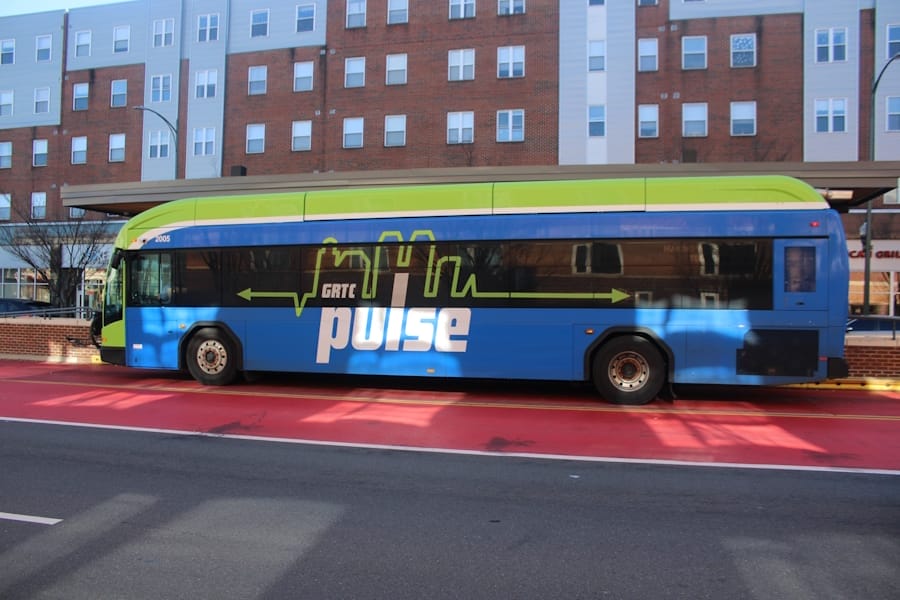Richmond planning organization receives $1 million grant from EPA

The Pulse rapid transit bus at the VCU/VUU bus stop on Broad Street. A federal grant awarded $1 million for localities to plan and implement climate solutions. Photo by Belinda Daniels.
Elliot Skelton, Contributing Writer
PlanRVA received a $1 million grant from the Environmental Protection Agency August 2023, according to Nicole Keller, PlanRVA’s resilience planner.
PlanRVA is a “government sub-entity but we do not have any regulatory power — so we specialize in providing our localities technical assistance, planning assistance and helping acquire funds and grants for those localities,” Keller said.
This grant was a part of the federal Inflation Reduction Act of 2022, a $783 billion act aimed largely at nationwide clean energy incentives. Its primary action report will be posted in March, according to its website.
Funds will be used to “develop a greenhouse gas reduction plan across the Richmond Metro Statistical Area,” according to its website.
The company aims to complete the long-term plan by 2050, according to Keller.
Keller said the grant covers a wider area than PlanRVA usually focuses on, and five Native American tribes are also covered.
“It’s not a Richmond city plan — this is a much larger regional plan,” Keller said.
The grant consists of two plans — one short-term “primary” plan due in March, and another longer-term “comprehensive” plan, according to Keller.
“Based on the feedback we heard from the public and from our localities, we chose to focus on the transportation and waste sectors,” Keller said.
Keller said the primary plan consists of six measures, from encouraging bicycles and electric vehicles, increasing access to public transportation to decarbonizing municipal operations.
“That could mean improving efficiency in municipal buildings, converting school buses to electric, that kind of thing,” Keller said.
The plans are not enforceable as laws, Keller said, and localities can figure out how to implement them.
“We’re setting intentions and saying, ‘OK, we are agreeing as a region that we want to reduce emissions from solid waste,’” Keller said.
The EPA requires that PlanRVA evaluate the potential impacts of the plan on low-income and disadvantaged communities as defined by the agency, Keller said. She said there are many factors that go into deciding whether a community is disadvantaged.
“It’s not just income — it’s burden from environmental impacts or lack of access to public transportation, a bunch of different things go into it,” Keller said.
Low-income and disadvantaged communities experience the effects of climate change disproportionately, according to Keller.
“That has to do with long term trends in planning and municipal actions that concentrated low income and people of color into areas that are most exposed to environmental hazards,” Keller said.
Keller said PlanRVA is looking to go well above what the EPA requires as a minimum for working with and taking feedback from communities.
“Some communities might be more concerned with air pollution from nearby plants, whereas others may want to prioritize tree planting because they are living in the urban heat island,” Keller said.
In the first survey, many people put litter high on their list of concerns, according to Keller.
“That would have been, without that public input, a relatively low priority action only because it doesn’t have any high greenhouse gas reduction potential,” Keller said.
Biology student Molly Pratt said the trash on the streets of Richmond is concerning.
Pratt said she uses reusable bags for grocery shopping but isn’t sure how much of a difference it makes on a larger level.
Isaac Martin, a media production student, suggested more green spaces, such as placing trees on rooftops.
“They don’t even need to be accessible, just there,” Martin said.
Carson Nealy, a mass communications major, said she does not eat red meat.
“The red meat industry can be pretty gnarly with the amount of carbon and methane,” Nealy said.
Maya Melito, a criminal justice student, said there is a benefit to biking instead of taking the bus. She also said the city should consider electric buses.
“Health policy hasn’t been addressed enough,” Sydney Price, a mass communications student, said. “Having VCU in Richmond, it’s possible to really create policies because we have MCV. They have a lot of resources that they could rely on to address the problems that climate change presents.”


